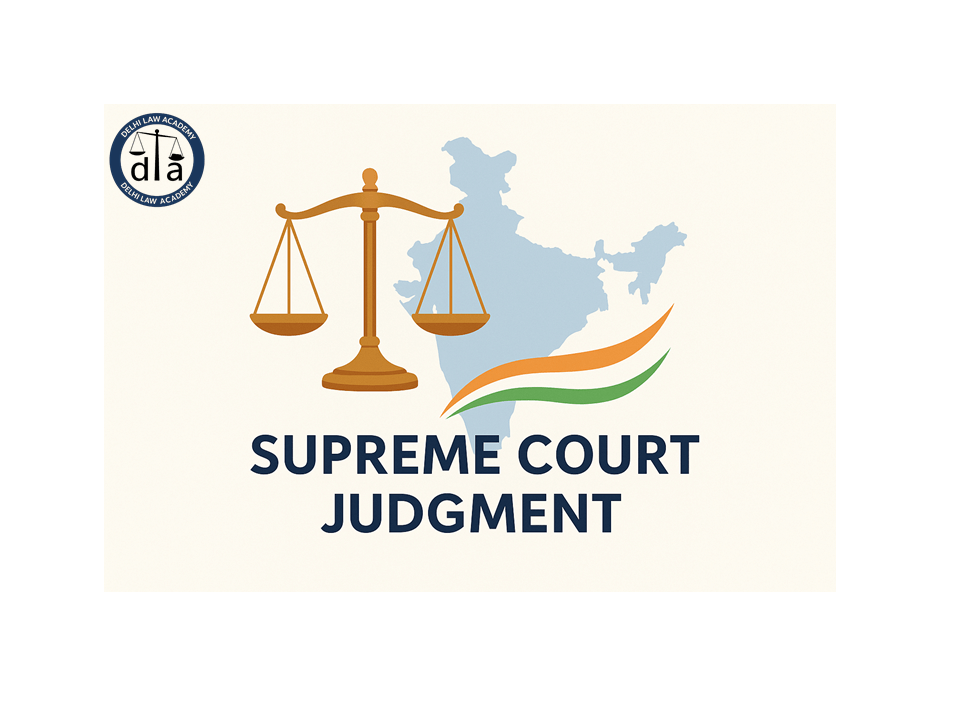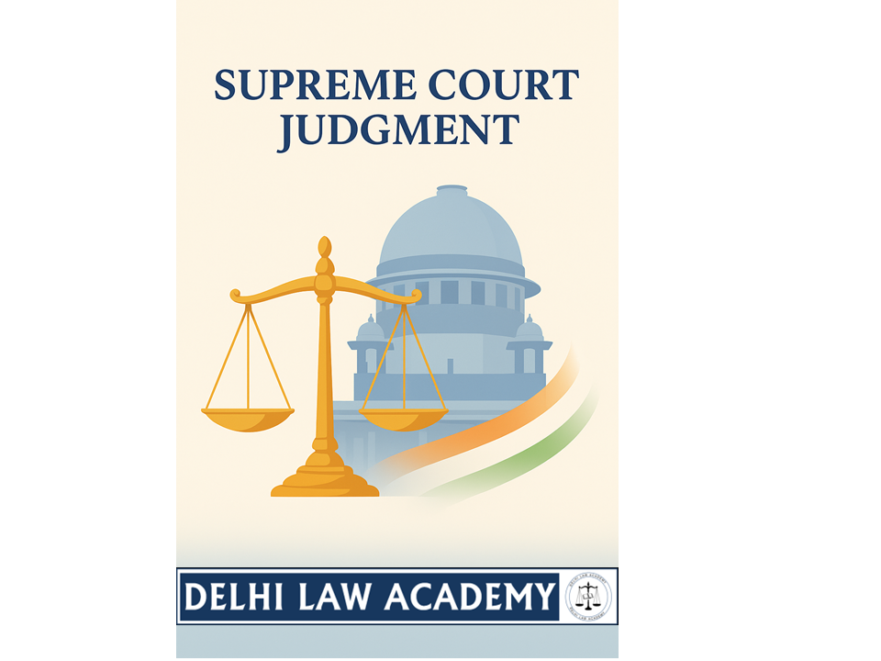
🧑⚖️ Testimony of Related Witnesses
📚 Case Reference
State of Rajasthan v. Teja Ram [2000 SC]
When any incident happens in a dwelling house the most natural witnesses would be the inmates of that house.
It is un-pragmatic to ignore such natural witnesses and insist on outsiders who would not have even seen anything.”
⚖️ About This Case
Delhi Law Academy Jaipur presents below for aspirants of Rajasthan Judicial Service (RJS), DJS, PCS(J) and other Judicial Services throughout India an extremely useful and important judgment of the Supreme Court of India declaring that the testimony of related witnesses may be good for conviction.
🧾 Judgment Summary
STATE OF RAJASTHAN v. TEJA RAM [2000]
J U D G M E N T
It was by a midnight blitz that two sleeping inmates of a dwelling house were axed to death by armed assailants. One of the victims was the old mother of the other victim. The younger among them was not the target of the assailants but he was mistaken for his brother. In the Sessions court seven persons were put on trial as the assailants in the aforesaid double murder episode. Out of them six were convicted under Section 302 read with Section 149 of the Indian Penal Code and for certain other lesser but allied offences. They were sentenced to imprisonment for life for the principal offence and for lesser terms for the lesser offences. When they appealed a Division Bench of the High Court of Rajasthan set aside the conviction and sentence and acquitted them all.
Prosecution case is that all the seven accused, armed with axe and lathis etc. travelled in a tractor and at a subsequent stage they walked on foot and reached the house of the deceased by midnight. Deceased Ram Lal and his mother Gamni were sleeping inside the room adjoining the gate of their house. Mota Ram used to sleep at that place but on the fateful night Ram Lal thought it convenient to sleep there as that was the cruel game of his fate. The assailants entered into the room and hacked both the deceased with axe. The squall of the victims rumbled the neighbourhood. All those who heard it rushed to the scene but by the time they reached the assailants took to their heels and escaped from the place. The SHO (PW21) recorded the statement of both the injured who were removed to the hospital thereafter. Ram Lal died on the same night, while his mother lived for a week more fighting with death and she too succumbed to the injuries on 21.9.1981.
Trial court, while convicting six accused, mainly relied on Ex. P31 and Ex.P32 which are the two dying declarations attributed to deceased Ram Lal and Gamni respectively which were recorded by PW21, the Investigating Officer. Besides the above, the trial court relied on certain circumstances, such as the testimony of witnesses who reached the scene saw the accused running away with axes and lathis, and recovery of the weapons effected pursuant to the informations elicited from the accused. But the Division Bench of the High Court of Rajasthan declined to act on the two dying declarations.
Another reason which the High Court advanced to repel the testimony of such a good number of probable witnesses is that they are all close relatives of the deceased and that independent witnesses were not examined by the prosecution. The over-insistence on witnesses having no relation with the victims often results in criminal justice going awry. When any incident happens in a dwelling house the most natural witnesses would be the inmates of that house. It is un-pragmatic to ignore such natural witnesses and insist on outsiders who would not have even seen anything…
One of the circumstances which trial court relied on as incriminating the accused is the recovery of two axes (Kulhadi) on the strength of statements of A1 Teja Ram and A2 Ram Lal. They were subjected to chemical examination and the result is that both axes were found stained with blood.
According to PW 21 (the Investigation Officer) A1 Teja Ram told him I have concealed the axe under some rags and kept it at the left corner of the hut in my farm at Dhokwa. The axe recovered pursuant thereto on 20.9.1981 as per Ex.P14 seizure memo was marked as Article No.8. Similarly, A2 Ram Lal has told the Investigation Officer that I have concealed the axe under some rags and placed it on a slab in the store of my house. On the said information another axe was recovered on 23.9.1981 as per Ex.P3 Seizure Memo. That axe has been marked as Article 1…
Learned counsel, in this context invited our attention to one step which PW21 (Investigating Officer) had adopted while preparing the seizure memos Ex.P3 and Ex.P.4. He obtained the signature of the accused concerned in both the seizure memos. According to the learned counsel the aforesaid action of the Investigating Officer was illegal and it has vitiated the seizure. He invited our attention to section 162(1) of the Code which prohibits collecting of signature of the person whose statement was reduced to writing during interrogation.
No doubt the aforesaid prohibition is in peremptory terms. It is more a direction to the investigating officer than to the court because the policy underlying the rule is to keep witnesses free to testify in court unhampered by anything which the police claim to have elicited from them. But if any Investigating Officer, ignorant of the said provision, secures the signature of the person concerned in the statement, it does not mean that the witnesses testimony in the court would thereby become contaminated or vitiated…
We, therefore, set aside the order of acquittal in so far as the said two accused (Teja Ram and Ram Lal) are concerned. We restore the conviction and sentence passed on them by the trial court.
🔗 Explore More
Want to learn more landmark judgments and legal concepts for Judiciary Exams? Visit www.delhilawacademy.com for detailed notes, mock tests, and expert guidance.
📚 Further Reading for Law Aspirants
Explore more useful resources from Delhi Law Academy to strengthen your preparation:
Contact us
📍 Delhi Law Academy – Jaipur Branch
6C, Tower 2, Coaching Hub, Pratap Nagar, Jaipur – 302033
📞 Phone:
+91 9911916552
+91 8447285606
✉️ Email:
contactus@delhilawacademy.com

